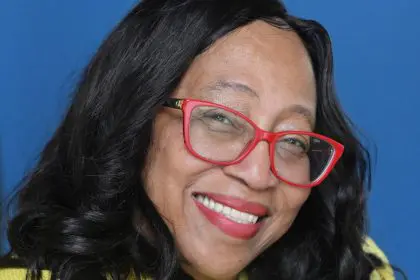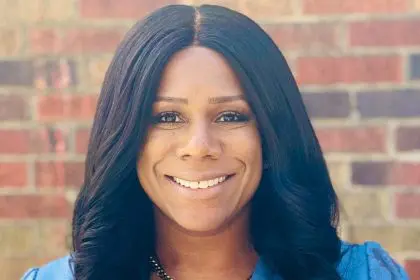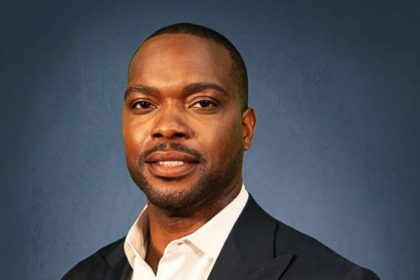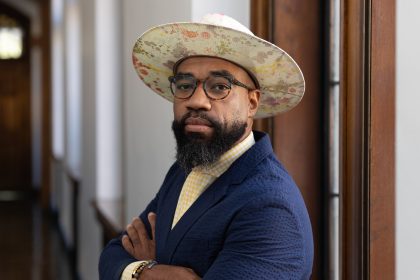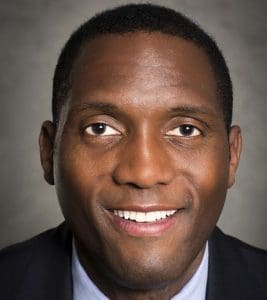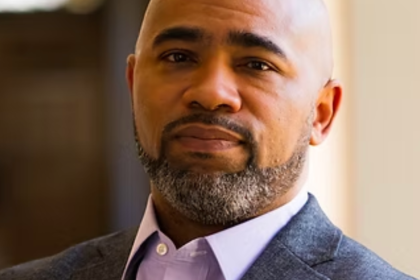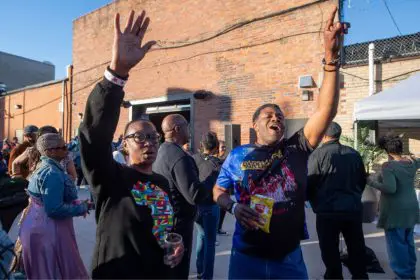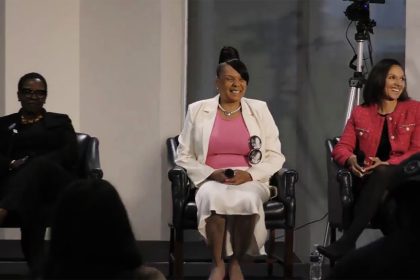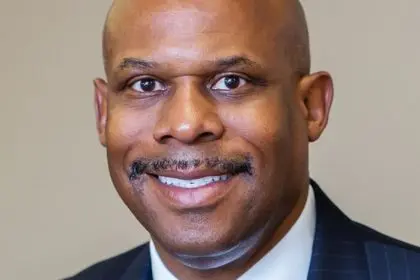Eddy Carrington brings over a decade of experience in property development to Flux City, particularly within Detroit. He has consistently demonstrated his ability to execute significant real estate projects, overseeing them from conception to completion. He oversees Flux City’s long-term business activities, which encompass investment, construction, design, and property management functions.
With a background in technology, banking, and real estate development, Carrington is well suited for Flux City’s mission to enrich the neighborhoods it serves through flexible design. His role ensures that Flux City delivers products that are both well-designed and well-positioned in the market, offering its tenants the best building locations, unit layouts, and community amenities.
He stopped by to chat with Munson Steed, publisher and CEO of rolling out. Here’s their conversation:
Philanthropic organizations like Rocket Community Fund and Gilbert Family Foundation are important players in Detroit. As a developer, when you really begin to work with someone like that, what’s the relationship? How can people know that they can build relationships with huge corporations and foundations that are looking to improve our community?
Yeah, interestingly enough, these organizations like Rocket Community Fund and Gilbert Family Foundation are looking to work with diverse developers. They’re looking for neighborhood projects that they can invest their dollars in to move the needle in one format or another. In Detroit, there’s a big push about walkable cities. In order to have a walkable city, you’ve got to have a solid commercial wall, and you also have to have a solid base of residents within these different communities, not just the downtown, midtown areas, but within the communities specifically here in the city of Detroit.
Organizations like Rocket Community Fund are looking for projects, looking for diverse founders, CEOs, developers to invest their dollars into to basically move the needle and have an overall effect of creating these micro neighborhoods that ultimately allow for the community to engage and live within in a format that they’re aiming for. It’s really mission-based from their end, which ultimately helps us as developers work with these funding partners to bring these visions and dreams to reality with regard to our developments and our ideas.
For young brothers and sisters who are really thinking about it, we know generational wealth is created with real estate. Where did you first get an idea? What industry did you come from to give credence to the fact that developer was a title that you could actually put on, and real estate was something that you knew you wanted to do in order to provide for your family and for your future?
Yeah, it’s a great question. At the end of the day, I didn’t have any real estate developers in my family or in my immediate network. It ultimately boils down to exposure. When I graduated from college, I started working at a bank, and some of my primary clients, or a majority of my clients, were individuals that worked at the Big 3: GM, Ford, Chrysler. Surprisingly, a lot of these clients of mine didn’t look at their social security, their 401(k), or their pension as a primary source of retirement. They looked at real estate as their primary source of income once they left the industry. That allowed me to be exposed indirectly to real estate based off what my clients at that time were doing. At that point, you were able to purchase property in the city of Detroit—brick homes, bungalows, three-bedroom, two-bath—for under 20 grand. In some scenarios, you still potentially can here in the city in 2024. But at the end of the day, these individuals kind of motivated me and exposed me to what is possible with real estate.
Fast forward to 2020, which is when I was awarded my first commercial project, I never thought of myself as a real estate developer, never thought of myself as being capable of tackling larger projects, just because I was not exposed to individuals that looked and talked like me, doing larger projects. That was until I snuck into Detroit Homecoming, an event for individuals from across the country that potentially may be from the city of Detroit or in the area that have potentially moved away, trying to entice them to come back home and potentially invest their dollars in the city of Detroit.
I was introduced to a developer by the name of Cliff Brown, who is doing amazing work across the city of Detroit. At that time, he was working on a project called The Co., which is in West Village. He was presenting his project, and he’s up there being comfortable. He has a hoodie on, he has Jordans on, and he’s talking about this multi-million dollar project. I’m like, wow! I saw myself in him. I was exposed to an individual that, once again, looked like me and reminded me of myself. When I saw him do what he was doing, I asked that question, “Hey, why can’t I do something of that nature as well?” That kind of expanded my horizon and pushed me to a point where I wanted to try my hand at multi-family facilities. That’s where we’re at today.
The capacity to learn and to adjust as a CEO, and to stretch the possibilities when you see it in front of you–how do you interpret that? You saw the hoodie, obviously that was a level of relief, but you really thought about his intellectual capacity that he shared. Are you educating yourself as you move forward? How do you learn for those young brothers and sisters? What gave you the stamina and the capacity to understand that you could do this?
Yeah, real estate specifically is one of those industries that you really can’t learn unless you’re doing it. Unless you’re buying a house, doing a little bit of the rehab yourself, doing the demo, or even before purchasing the property, driving through neighborhoods that you may be interested in investing your dollars in. It’s really a loaded question because there are so many ways that I’ve learned to be resilient in this industry and continue to learn. When it comes to real estate, not too many people will talk to you about their failures. But I guarantee you, 99.9% of the people in real estate have bought a bad deal or have lost money in one format or another, including myself. You basically have to keep going.
A lot of times, people who are getting into the investment realm of real estate, fixing and flipping, or renting and buying to rent them out, find themselves buying their first and only property because of the disconnect between what they thought was going to happen and what actually is reality. Whether it be purchasing a property and not realizing the rehab cost is two or three times more than what you budgeted, purchasing a property, finding a group of contractors that may not necessarily be able to perform at the expectation that you have for them, or they may take your deposit and not show up the second day at all. That happens in the city of Detroit and across the country. There is a lack of skilled trades here in the city of Detroit. The assumption that you can buy a house, and you can guesstimate what the rehab cost is, and you ultimately can get from point A to point B in a scheduled term or timeframe of, let’s say, three months, is really something that is very hard to achieve.
Every property has been different with regard to the outcome, with regard to the team that I’d have to put in place. When I talk about team, I’m talking about the subcontractors, the GCs that I work with. It’s been a learning experience that no matter how much somebody would tell you what to do and what not to do, you just have to go at it on your own. Not necessarily on your own in the format of not having assistance and mentorship and people who are willing to give you direction, but you just have to get in the game to really understand what you’re getting yourself into.
One thing I want to point out is the city of Detroit has, surprisingly, a robust set of options to allow for diverse developers to gain knowledge, to gain connections, and to gain education more or less through what is called the Building Community Value Initiative. Capital Impact Partners has what is called an Equitable Development Initiative here in the city of Detroit. That’s like a master class of developing commercial real estate, whereas Building Community Value has a master class at developing residential structures. We, as emerging developers, have access to these different programs. Not to mention there’s READ (Real Estate Association of Developers). It’s a minority development group that meets pretty consistently throughout the year, and they provide a ton of different speakers and resources that we have access to and different events that we are all able to engage with and network between, which ultimately allows us to have those opportunities to learn consistently throughout the year.
When you think about Flux City, why’d you name your company Flux City, and how important is flexible space and community development for our community?
Flux is looked at as a negative word. A state of constant change is the definition of flux. However, we look at that as something that is positive. Being able to have the ability to change with the community, with the neighborhood, with your tenants, having that resiliency with regard to different market conditions. We strive to have these different projects that we’re working on be flexible in nature, allowing us to adjust with the different variables that come with the built environment and what is surrounding it. At the end of the day, we are looking to create spaces that can change with the times in a format that doesn’t require us to continuously tear down these facilities, comparative to certain projects and developments that may be one thing and one thing only.
You’re invited to “Dream Doors Lunch & Learn.” Tap here to RSVP –

